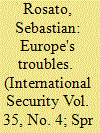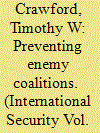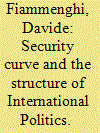|
|
|
Sort Order |
|
|
|
Items / Page
|
|
|
|
|
|
|
| Srl | Item |
| 1 |
ID:
103653


|
|
|
|
|
| Publication |
2011.
|
| Summary/Abstract |
The 1990s were years of great optimism in Europe. As the Europeans were putting the finishing touches on their economic community, observers predicted that political and military integration would soon follow. Optimism has turned to pessimism since the turn of the century, however. Most analysts believe that the economic community is in crisis, and hardly anyone predicts the creation of a political or military counterpart to it. Why has the European project run into trouble and what does the future hold? The answers to these questions are largely to be found in the distribution of power. It was the overwhelming power of the Soviet Union that drove the Western Europeans to consider a variety of integration initiatives and to build and maintain the European Community (EC) during the Cold War. In 1991 the collapse of the Soviet Union deprived them of a compelling geostrategic reason to pursue further integration or even to preserve their economic community. As a result, the Europeans have made no real effort to establish a political or military community over the past two decades, and the EC has slowly started to fray. As long as there are no significant changes in the balance of power going forward, worse times lie ahead.
|
|
|
|
|
|
|
|
|
|
|
|
|
|
|
|
| 2 |
ID:
103652


|
|
|
|
|
| Publication |
2011.
|
| Summary/Abstract |
There is broad scholarly consensus that the relative power of the United States is declining and that this decline will have negative consequences for international politics. This pessimism is justified by the belief that great powers have few options to deal with acute relative decline. Retrenchment is seen as a hazardous policy that demoralizes allies and encourages external predation. Faced with shrinking means, great powers are thought to have few options to stave off decline short of preventive war. Contrary to the conventional wisdom, however, retrenchment is not a relatively rare and ineffective policy instrument. A comparison of eighteen cases of acute relative decline since 1870 demonstrates that great powers frequently engage in retrenchment and that retrenchment is often effective. In addition, we find that prevailing explanations overstate the importance of democracies, bureaucracies, and interest groups in inhibiting retrenchment. In fact, the rate of decline can account for both the extent and form of retrenchment, even over short periods. These arguments have important implications for power transition theories and the rise of China.
|
|
|
|
|
|
|
|
|
|
|
|
|
|
|
|
| 3 |
ID:
103656


|
|
|
|
|
| Publication |
2011.
|
| Summary/Abstract |
States use wedge strategies to prevent hostile alliances from forming or to disperse those that have formed. These strategies can cause power alignments that are otherwise unlikely to occur, and thus have significant consequences for international politics. How do such strategies work and what conditions promote their success? The wedge strategies that are likely to have significant effects use selective accommodation-concessions, compensations, and other inducements-to detach and neutralize potential adversaries. These kinds of strategies play important roles in the statecraft of both defensive and offensive powers. Defenders use selective accommodation to balance against a primary threat by neutralizing lesser ones that might ally with it. Expansionists use selective accommodation to prevent or break up blocking coalitions, which isolates opposing states by inducing potential balancers to buck-pass, bandwagon, or hide. Two cases-Great Britain's defensive attempts to accommodate Italy in the late 1930s and Germany's offensive efforts to accommodate the Soviet Union in 1939-help to demonstrate these arguments. By paying attention to these dynamics, international relations scholars can better understand how balancing works in specific cases, how it manifests more broadly in international politics, and why it sometimes fails in situations where it ought to work well.
|
|
|
|
|
|
|
|
|
|
|
|
|
|
|
|
| 4 |
ID:
103654


|
|
|
|
|
| Publication |
2011.
|
| Summary/Abstract |
President George W. Bush's Iraq surge decision in late 2006 is an interesting case for civil-military relations theory, in particular, the debate between professional supremacists and civilian supremacists over how much to defer to the military on decisions during war. The professional supremacists argue that the primary problem for civil-military relations during war is ensuring the military an adequate voice and keeping civilians from micromanaging and mismanaging matters. Civilian supremacists, in contrast, argue that the primary problem is ensuring that well-informed civilian strategic guidance is authoritatively directing key decisions, even when the military disagrees with that direction. A close reading of the available evidence-both in published accounts and in new, not-for-attribution interviews with the key players-shows that the surge decision vindicates neither camp. If President Bush had followed the professional supremacists, there would have been no surge because his key military commanders were recommending against that option. If Bush had followed the civilian supremacists to the letter, however, there might have been a revolt of the generals, causing the domestic political props under the surge to collapse. Instead, Bush's hybrid approach worked better than either ideal type would have.
|
|
|
|
|
|
|
|
|
|
|
|
|
|
|
|
| 5 |
ID:
103655


|
|
|
|
|
| Publication |
2011.
|
| Summary/Abstract |
Realist scholars have long debated the question of how much power states need to feel secure. Offensive realists claim that states should constantly seek to increase their power. Defensive realists argue that accumulating too much power can be self-defeating. Proponents of hegemonic stability theory contend that the accumulation of capabilities in one state can exert a stabilizing effect on the system. The three schools describe different points along the power continuum. When a state is weak, accumulating power increases its security. This is approximately the situation described by offensive realists. A state that continues to accumulate capabilities will eventually trigger a balancing reaction that puts its security at risk. This scenario accords with defensive realist assumptions. Finally, when the state becomes too powerful to balance, its opponents bandwagon with it, and the state's security begins to increase again. This is the situation described by hegemonic stability theory. These three stages delineate a modified parabolic relationship between power and security. As a state moves along the power continuum, its security increases up to a point, then decreases, and finally increases again. This modified parabolic relationship allows scholars to synthesize previous realist theories into a single framework.
|
|
|
|
|
|
|
|
|
|
|
|
|
|
|
|
|
|
|
|
|